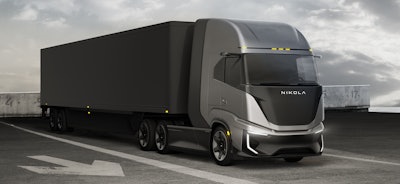
Nikola Corporation recently unveiled details about its North American hydrogen fuel-cell electric vehicle (FCEV) commercial truck program, which includes fuel-cell variants of the Nikola Tre cabover and the long-range Nikola Two FCEV Sleeper “targeting best-in-class efficiency for ranges between 300-900 miles in the North American market,” the company said.
With the announcement, the company’s portfolio now includes trucks for various trucking segments:
- Metro/Regional – Nikola Tre BEV Cabover for trips up to 300 miles
- Regional – Nikola Tre FCEV for longer-range needs of up to 500 miles and for fast fueling/quick turnaround needs
- Long-Haul – Nikola Two FCEV Sleeper for long-range trips up to 900 miles
The Nikola Tre FCEV Cabover is targeted for distances up to 500 miles and is expected to address the majority of the North American regional market, especially use cases where additional freight hauling capacity and quick fueling are required by fleet operators. The Tre FCEV leverages the Tre BEV platform with hydrogen fuel-cell power, while being designed to improve aerodynamics and reduce total vehicle weight.
The first Tre FCEV prototype builds are scheduled to begin in Arizona and Ulm, Germany, in the second quarter of 2021, with testing and validation of the vehicles continuing into 2022, and production commencing planned for the second half of 2023.
The Nikola Two FCEV Sleeper is a long-haul freight option with hydrogen capacity allowing a non-stop range of up to 900 miles, leveraging the weight advantage of hydrogen in long-range, long-haul zero-emission trucking. The truck will be based on a new chassis custom designed for North American long-haul routes and is anticipated to launch in late 2024.
The Nikola Tre and Nikola Two FCEVs are expected to utilize multiple common fuel-cell power modules and scalable hydrogen storage systems. Both systems are currently in development and testing with industry leaders in collaboration with Nikola Engineering. The first Tre prototypes utilizing these systems are expected to begin road testing in 2022.








